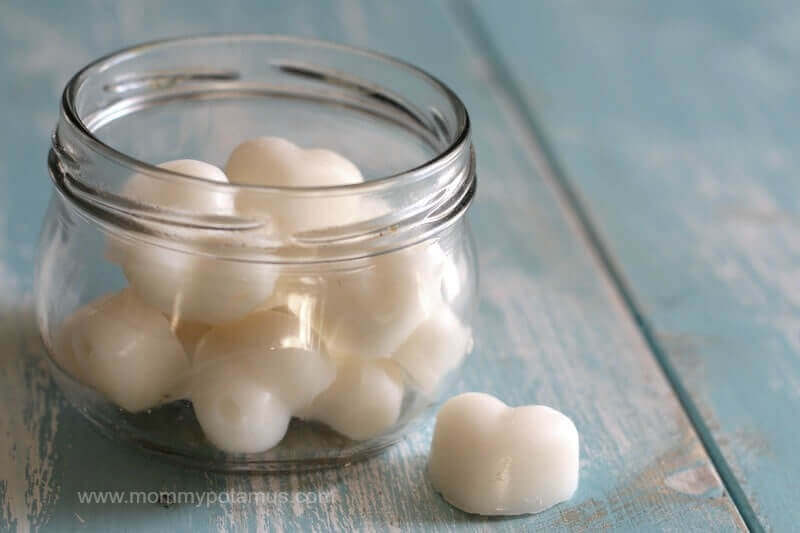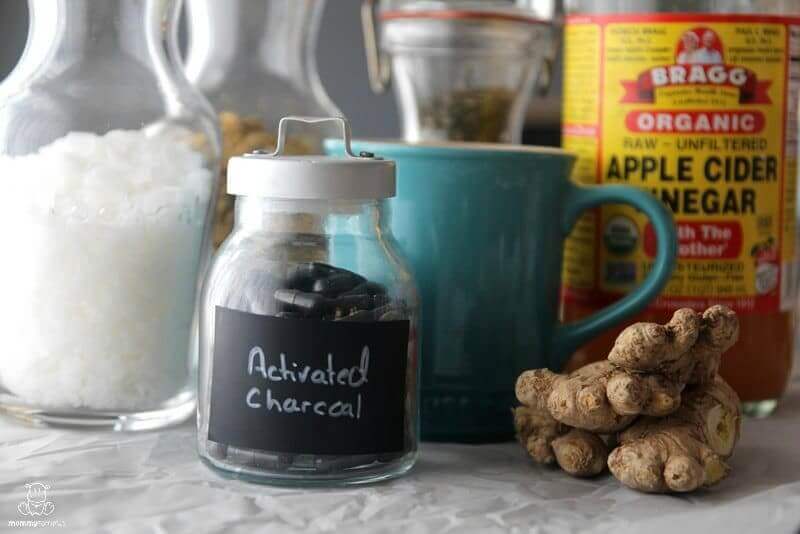
“Mommy, my tummy hurts.” << Have you ever heard those words, asked where it hurts and watched your child point to their WHOLE tummy, plus maybe an elbow and an earlobe for good measure? Same here.
Over the years I’ve put together a six-question tummy ache checklist that helps me better understand what my child is feeling, plus several time-honored (and research supported) home remedies for an upset stomach.
You’ll find them below along with additional guidelines from Boston Children’s Hospital, but first I want to mention that none of these statements have been evaluated by the FDA, this article has been medically reviewed for accuracy but is not medical advice, and it is not meant to diagnose or treat any condition. Please talk with your healthcare provider about what approach is best for your child.
- Why does my child have stomach issues?
- Why not just use the pink stuff?
- My 6-Question Stomach Ache Checklist
- 8 Home Remedies For Upset Stomach
- 1 – Magnesium
- 2 – Probiotics
- 3 – Massage
- 4 – Activated Charcoal
- 5 – Herbal Tea Or Ginger Ale
- 6 – Apple Cider Vinegar
- 7 – Warm Compress/Hot Water Bottle
- 8 – Acupressure
- Call a doctor when . . .
Ready to dive in? Good! Before we go over the checklist, I thought you might be wondering…
Why does my child have stomach issues? ^
What is the difference between a child with stomach issues and a child without? According to Dr. Madiha Saeed, a board certified family physician whose feedback I asked for while writing this article, the answer is the environment.
A huge point of connection between a child’s outside world and inside world is the digestive tract, starting with the mouth and ending . . . well, you know. When your child eats and drinks, they’re drawing elements from the larger world into their inner environment. That can be a good thing – for example, when they eat a probiotic-rich pickle – or a not so good thing if they encounter pesticide residue or environmental toxins.
When a child’s internal and external worlds are balanced, everything works better. That’s because the majority of their immune system (70-80%) and 100 the trillion microbes (that dictate their health and even affect their genes) are in their gut/digestive tract.
Processed foods and environmental toxins can disrupt the balance of gut bacteria. If the imbalance goes on for a while, pathogenic microbes or improperly digested proteins may activate the immune system, creating a “fire” in the gut as they trigger immune cells that cause inflammation and damage the gut wall epithelial cells/junctions between the cells.
Over time, this leads to increased intestinal permeability, which is sometimes known as leaky gut syndrome. When a child’s gut becomes permeable, weak and compromised, it allows things to pass through the membrane into the bloodstream that normally would not, such as undigested food particles, gluten, viruses, bad bacteria and toxins that trigger the immune system and imbalance the gut microbiome even more. Gut dysbiosis and/or leaky gut syndrome can kids more vulnerable to stomach issues, allergies, and autoimmune issues.
To improve stomach issues, Dr. Saeed suggests lowering the fire in the gut and helping the stomach work better with the 5 R’s.
- Remove the food that could be bothering your child (it may also be helpful to talk with your provider about other potential sources of irritation, like chronic infections)
- Replenish with real food while supporting digestion
- Repopulate and restore the balance of the good bacteria with probiotics and prebiotics
- Repair the gut lining to ensure proper absorption of nutrients and gut function
- Rebalance by reducing exposure to environmental toxins
Why not just use the pink stuff? ^
I’m talking about the sweet, ooey-gooey liquid most of us took as children, of course. I loved the flavor of that stuff, which is why I was surprised and saddened to learn that it’s not actually recommended for kids under 12 due to safety concerns. Namely, that the active ingredient in the original version (which is still sold today) is bismuth, a heavy metal.
And we’re not just talking about a little bismuth. According to this Popular Science article:
Most modern medicines are carefully synthesized organic molecules so potent that each pill contains only a few milligrams of the active ingredient. Pepto-Bismol is a fascinating exception, both because its active ingredient is bismuth, a heavy metal commonly used in shotgun pellets, and because there is a lot of it in each dose. So much, in fact, that I was able to extract a slug of bismuth metal from a pile of pink pills.”
Ironically, large amounts of bismuth can cause some of the very symptoms it is used to treat – constipation, diarrhea, nausea and vomiting. (1)
There is a newer, bismuth-free version that is made for kids, but like the original it contains artificial dyes and other ingredients I want to avoid. For that reason, I use time honored (and research supported) home remedies when my kids have a tummy ache.
My 6-Question Stomach Ache Checklist ^
When my kids have a stomach ache, I ask them the questions below. They were inspired by this wonderful article from Scholastic, and I’ve found them to be a good starting point for figuring out what remedies make the most sense.
Knowing the answers to these questions can also be really helpful when talking things through with your SteadyMD doctor or other care provider if needed. After we run through them, I’ll share in more detail about some home remedies I’ve found helpful and the research that supports their use.
Question #1: Does it hurt to go potty?
This may indicate constipation. When this is the case, children sometimes complain that it hurts to go to the bathroom, or experience “Crampy pain that occurs an hour or two after a meal.” (2) (3)
Home Remedies That May Help: Magnesium, Probiotics, Massage, Acupressure. For occasional use, this senna laxative can also be really helpful. It’s flavored with safe ingredients like organic caramel and vanilla to make it kid-friendly. There’s an adult version available, too.
Lifestyle Changes To Consider: If constipation is a frequent issue, Dr. Saeed suggests removing common foods that may be leading to gut issues, like gluten, dairy, processed foods or sugar and focusing on vegetables, clean protein, healthy fats, fermented foods and bone broth. It’s important to make sure the child is well hydrated, too.
Repopulating the gut with probiotics (either from foods or supplements) and prebiotics (aka “food” for probiotic) can also be helpful.
According to Dr. Saeed, “Children should be eating their prebiotics, found in green leafy vegetables and other high-fiber foods are especially good at promoting growth of good bacteria, along with asparagus, carrots, garlic, leeks, raw onions, radishes, avocados, broccoli, Brussel sprouts, cucumber, nuts/seeds, lentils and tomatoes and resistant starches like inulin and root vegetables.
She also suggests supporting gut repair with foods rich in nutrients like zinc, vitamin A, vitamin C, and omega 3s and rebalancing the body by correcting any nutritional deficiencies that are present. She notes that magnesium deficiency, for example, can lead to constipation.
Question #2: Do you have diarrhea?
According to the Scholastic article, “Having the runs occasionally is common in kids. But when kids pass loose stools three or more times a day, it’s most often brought on by gastroenteritis, a viral infection of the stomach and intestines (a.k.a. a stomach bug). Certain meds (like antibiotics), food poisoning, bacterial infections, and parasites from contaminated food or water also bring on the runs. ‘Diarrhea is very common,’ says Dr. Rosen. ‘If it happens a lot, it could mean food allergies or a gastrointestinal condition like celiac disease.’”
Home Remedies That May Help: Probiotics & Prebiotics, Acupressure, Activated Charcoal
Lifestyle Changes To Consider: If constipation is a frequent issue, getting to the root cause is important. Your care provider may suggest testing for food allergies or celiac disease, etc. If an allergy is identified you’ll want to remove that food, then focus on the other R’s listed above – replenishing with real food, repopulating with good bacteria, repairing the gut lining, and rebalancing the body by reducing exposure to toxins.
Question #3: Are you belching or tooting a lot?
This may indicate gas or bloating.
Remedies That May Help: Probiotics, Massage, Herbal Tea, Activated Charcoal
Lifestyle Changes To Consider: If gas is a frequent issue, Dr. Saeed suggests incorporating the suggestions above while also optimizing your child’s ability to digest food.
If your child is putting in the effort to eat healing rainbow foods (foods that are naturally vibrant in color and nutrients), it’s important to make sure they’re actually digesting what they’re eating. Digestive bitters, lemon water, apple cider vinegar can help to boost stomach acid, which is necessary for an optimal digestion.
If your child needs more help with digesting, it’s best to talk to a functional medicine doctor that can help you find if your child is making enough stomach acid or needs extra digestive support with digestive enzymes. The practitioner may check for optimal stomach acid with a baking soda test.
Question #4: Are you feeling upset or scared?
“Vague belly pain is something a lot of kids between the ages of 2 and 8 say they have when they need attention or they’re feeling stressed, says Dr. Kligler. ‘That’s the place where they experience worry.’” (4)
Remedies That May Help: Magnesium, Massage, Acupressure, Herbal Tea
Question #5: Do you feel like you might throw up?
If the answer is yes, there are several herbal teas that have been traditionally used for nausea.
Remedies That May Help: Herbal tea, Homemade Ginger Ale
Question #6: Do you feel any burning? Where?
When I ask this, I’m checking to see if indigestion/heartburn might be an issue. I keep following with clarifying questions until I’m sure it’s not simply a sore throat. If I think it’s indigestion, I might try a digestive tonic or bone broth.
Remedies That May Help: Digestive tonic such as these chamomile bitters or apple cider vinegar.
Lifestyle Changes To Consider: If indigestion is frequent, Dr. Saeed suggests eliminating gluten, dairy and processed foods.
8 Home Remedies For Upset Stomach ^
Once I have a sense of what the issue might be, I’ll decide on a plan. Most often I’ll choose the remedy or remedies that best fits the situation, but if I’m not sure I’ll reach out to our care provider for additional insight. SteadyMD, which has functional medicine doctors on staff, is a great option for talking through things.
Here are my go-to at-home options:
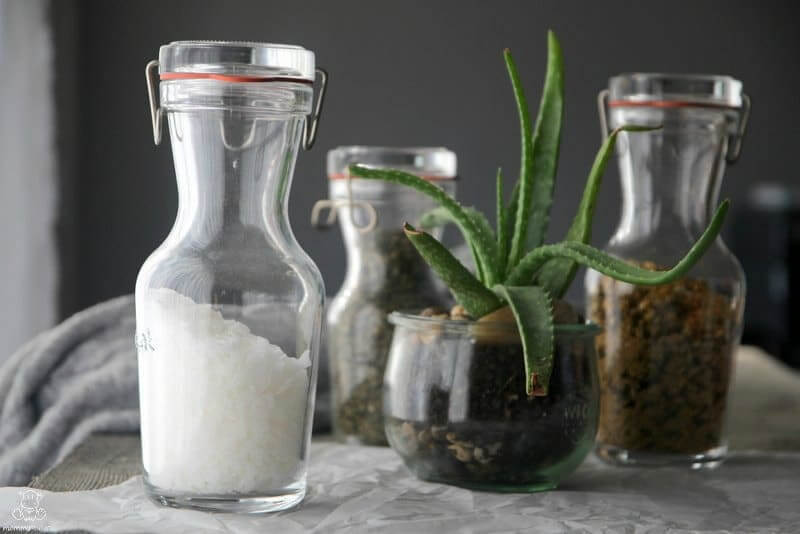
1 – Magnesium ^
May Be Helpful For: Constipation, Emotional Upset
According to Dr. Carolyn Dean, author of The Magnesium Miracle, low magnesium levels can slow down the bowels and cause constipation. Not all forms of magnesium are absorbed well via the digestive tract, so I’ve written a guide to choosing magnesium supplements.
Since magnesium is well-absorbed through skin, another option for improving levels is through topical application like epsom salt baths or magnesium body butter.
Magnesium is also often referred to as the “Relaxation Mineral” and the “Ultimate Chill Pill” because of its ability to promote relaxation and help the body adapt to stress, which may be helpful if a stomach ache is due to emotional upset. (5)(6)
It’s also vital to other functions such as detoxification, sleep, and the creation of proteins – click here to learn more about the benefits of magnesium.
2 – Probiotics ^
May Be Helpful For: Supporting Healthy Bowel Function/Getting Things Moving
According to Harvard Health Publications, researchers at King’s College in London reviewed 14 well constructed studies and found that probiotics reduced “‘gut transit time’ by 12.4 hours, increased the number of weekly bowel movements by 1.3, and helped soften stools, making them easier to pass.”
3 – Massage ^
May Be Helpful For: Constipation, Emotional Upset, Gas
Pediatric acupuncturist Robin Green has created a wonderful tutorial that demonstrates the benefits of Tuina massage for helping the bowels move – plus tips on how to do it – here.
Also, here is a more general tutorial on how to massage constipated babies and children, and here is a tutorial on moving gas bubbles through the gut. Of course, massage is also helpful for soothing and calming children. I love to massage my little one’s hands or backs while we talk. (They giggle too much when I rub their feet, unfortunately.)
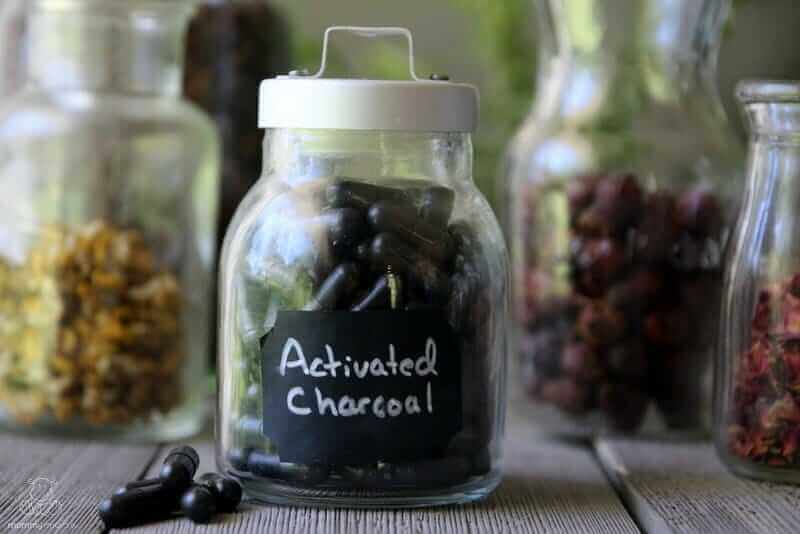
4 – Activated Charcoal ^
May be helpful for: Diarrhea, Nausea, Tummy Bug, Mild Food Poisoning
Activated charcoal has lots of uses, including absorbing toxins. It’s listed in the World Health Organization Model List of Essential Medicines and is often used in emergency rooms to treat certain kinds of poisonings. (7)
In Kentucky, a poison control center even conducted a study which encouraged parents to stock it for emergency situations. When parents called, the pharmacist, nurse, or healthcare provider would direct them to use it when appropriate. The 18-month study found that when parents acted with the guidance of a qualified healthcare provider, having activated charcoal on hand improved outcomes for children. (8)
Although this article is about non-emergency uses for activated charcoal, before we dive into those I want to say that activated charcoal doesn’t bind to all types of toxins (alcohol, lye, iron, lithium, petroleum products and some cleaning products, for example) and no one should ever try to treat poisoning or overdose on their own. Seek medical attention immediately if you suspect you or someone else has ingested something harmful so that your provider can determine the best course of action.
So how can activated charcoal help tummies?
It’s used in many water filters to remove bacteria and viruses, so it makes sense that it could support the body in flushing out certain things that are not supposed to be there. Interestingly, this study found that activated charcoal bound more strongly to e. coli than the normal (beneficial) bacteria found in the digestive tract.
Many practitioners recommend it for a variety of situations including gas, tummy bugs, and food poisoning. According to James F. Balch, M.D., Mark Stengler N.M.D, and Robin Young Balch, N.M.D – authors of Prescription for Natural Cures: A Self-Care Guide For Treating Health Problems With Natural Remedies – activated charcoal can be used “to reduce digestive flatulence and also to absorb harmful toxins, including infectious agents that cause diarrhea.” (9)
Although the exact mechanism is not known, one study does seem to support the potential benefit of activated charcoal for gas. Participants with a history of gas that was excessive enough to obstruct the view of internal organs on an abdominal ultrasound were given 448 milligrams (mg) of activated charcoal three times a day for 2 days before another intestinal ultrasound, plus another 672 mg on the morning of the procedure.
After taking the activated charcoal, visibility on the ultrasound increased significantly. (10)
Drs. Balch and Stengler also recommend activated charcoal for mild cases of food poisoning, as does pharmacist Ben Fuchs, who writes:
Personally, I keep a bottle of activated charcoal capsules in my medicine cabinet at home, and I had a ten-pound jar of it at my pharmacy for years. I’ve used it for food poisoning, to reduce unpleasant digestive symptoms like gas and bloating and for dealing with the stomach flu.” (11)
The appropriate amount to give should be discussed with your care provider because it will vary by age and other factors. There are situations where activated charcoal is not recommended, such as “if the person is unconscious, has a gut issue that might require surgery, or has taken substances that are not absorbed well by activated charcoal.” (12)

5 – Herbal Tea Or Ginger Ale ^
May Be Helpful For: Nausea, Emotional Upset, Gas
Chamomile – According to this analysis, chamomile tea “is especially helpful in dispelling gas, soothing the stomach, and relaxing the muscles that move food through the intestines.” The researchers also noted that it may have a calming, sedative effect as well.
Fresh Ginger or Dried Ginger Root – According to the University of Maryland Medical Center, “Children over 2 make take ginger to treat nausea, stomach cramping, and headaches. Ask your doctor to help you find the right dose.” Ginger can be brewed as a tea, decocted into ginger syrup, or made into homemade ginger ale. Adding a little lemon juice or apple cider vinegar to ginger tea can often be helpful in cases of indigestion.
Peppermint – Mount Sinai Medical Center states that “Peppermint (Mentha piperita), a popular flavoring for gum, toothpaste, and tea, is also used to soothe an upset stomach or to aid digestion. Because it has a calming and numbing effect, it has been used to treat headaches, skin irritations, anxiety associated with depression, nausea, diarrhea, menstrual cramps, and flatulence.” The article also cautions that peppermint should not be given to babies or small children.
Marshmallow Root – The Greek name for marshmallow root – althea – literally means “to heal.” It contains a polysaccharide that coats and protects irritated mucous membranes, and it’s amazing for sore throats, stomach aches, heartburn, skincare and more. I use it in my sore throat soother tea, which also contains herbs that are helpful for stomach aches.
Fennel Seeds – These seeds have been traditionally used for “various digestive problems including heartburn, intestinal gas, bloating, loss of appetite, and colic in infants.” (13)
Lemon Balm – According Rosemary Gladstar, author of this book on medicinal herbs, “A tea made of lemon balm and chamomile is an excellent remedy for stomach distress and nervous exhaustion.” (1)
It has has been traditionally used for easing symptoms of dyspepsia (aka indigestion) and bloating. Although not a lot of research has been done in this area, one small study did find that participants who ate a dessert infused with lemon balm had fewer digestive issues than those who didn’t.
For digestive upset, it is often combined with chamomile, hops or meadowsweet. (17) Here’s how to make lemon balm tea.
Caraway Seed – “Caraway is used for digestive problems including heartburn, bloating, gas, loss of appetite, and mild spasms of the stomach and intestines.” (14)
Yarrow – “Yarrow is an anti-inflammatory herb useful in the treatment of diarrhea, flatulence, gastrointestinal inflammation, and stomach cramps. This herb can reduce smooth muscle spasms, which makes it useful for certain gastrointestinal conditions. Yarrow is also a traditional stomach tonic and digestive aid.” (9)
6 – Apple Cider Vinegar ^
May Be Helpful For: Indigestion
We’ve all heard that heartburn is caused by excess stomach acid. But after testing thousands of heartburn patients at his Tahoma Clinic, Jonathan Wright, M.D., says that’s not true in over 90% of cases. In fact, he says, heartburn is most often caused by low stomach acid.
Apple cider vinegar, which raises acid levels in the stomach, has long been used as a folk remedy for indigestion. Find out more about how it is used as a digestive aid here.
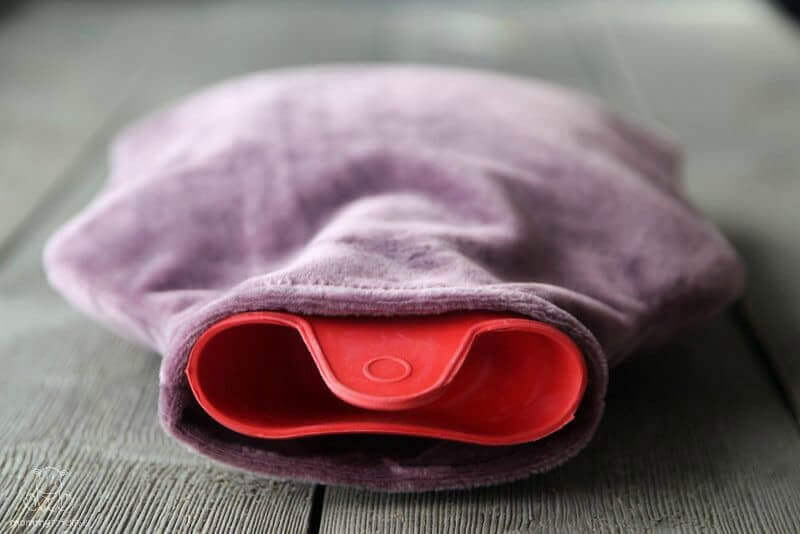
7 – Warm Compress/Hot Water Bottle ^
May Be Helpful For: All Types Of Tummy Ache
Warmth sometimes has a soothing, relaxing effect, so a warm compress or hot water bottle might be worth trying.
8 – Acupressure ^
May Be Helpful For: Constipation, Diarrhea, Emotional Upset
A book I’m reading right now – 12 Acupressure Points For Pediatric Sleep & Wellness – has protocols for both constipation and diarrhea that may be useful. According to the World Health Organization:
Though acupressure and acupuncture are not often embraced by western medicine, the World Health Organization has recognized acupuncture as an effective modality for a variety of conditions, including low back pain, neck pain, sciatica, knee pain, periarthritis of the shoulder, facial pain (including craniomandibular disorders), headache, dental pain, temporomandibular (TMJ) dysfunction, rheumatoid arthritis, induction of labor, morning sickness, nausea and vomiting, postoperative pain, stroke, essential hypertension, primary hypotension, renal colic, leucopenia, adverse reactions to radiation or chemotherapy, allergic rhinitis, including hay fever, biliary colic, depression (including depressive neurosis and depression following stroke), acute bacillary dysentery, primary dysmenorrhea, acute epigastralgia, peptic ulcer and acute and chronic gastritis. (15) (emphasis mine)
Acupressure also has a long history of use as a calming technique.
Call a doctor when . . . ^
Last year when my son hurt his wrist, I quickly realized we were probably dealing with more than a sprain and he needed to be checked out by a doctor. It was broken, and I’m so grateful for the wonderful care he received.
Part of how I came to that conclusion was via some “when to see a doctor” training I’d received, which was invaluable in that moment. With that in mind, I want to share these guidelines regarding abdominal pain from Boston Children’s Hospital:
“For mild abdominal pain, you can typically wait for your child to get better with home care remedies. You should call your doctor if your child has:
- stomach pain that lasts more than a week, even if it comes and goes
- stomach pain that gets more severe and frequent, or makes the child nauseous or vomit with pain
- stomach pain that does not improve in 24 hours
- a burning feeling during urination
- diarrhea for more than two days
- vomiting for more than 12 hours
- fever over 100.4 degrees Fahrenheit
- poor appetite for more than two days
- unexplained weight loss
In some cases, abdominal pain is the sign of something more serious. You should seek medical help immediately if your child:
- is a baby younger than 3 months and has diarrhea or vomiting
- is unable to pass stool, especially if the child is also vomiting
- is vomiting blood or has blood in the stool (especially if the blood is maroon or dark, tarry black)
- has sudden, sharp abdominal pain
- has a rigid, hard belly
- has had a recent injury to the abdomen
- is having trouble breathing
- is currently being treated for cancer”
This article was medically reviewed by Madiha Saeed, MD, a board certified family physician. As always, this is not personal medical advice and we recommend that you talk with your doctor.
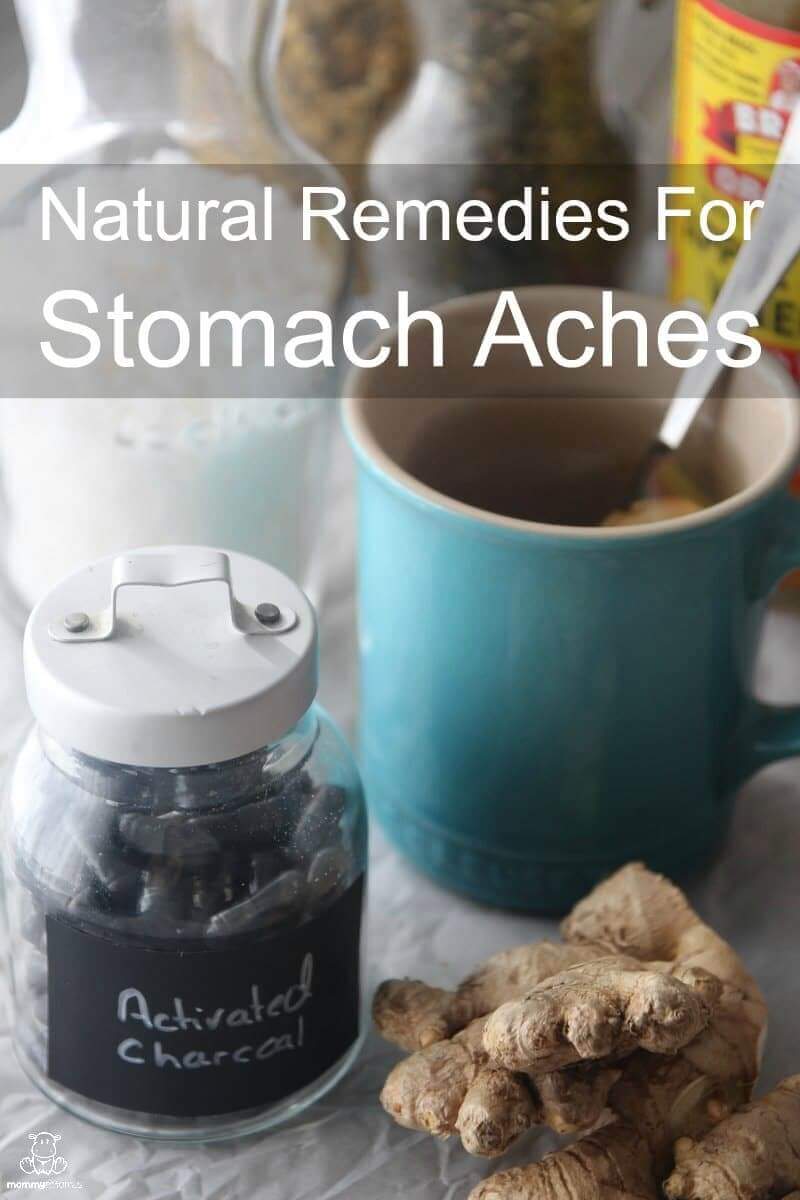
Want more research-backed natural remedies?
No problem, I’ve created a free ebook for you – Kitchen Apothecary: 25+ Natural Remedies Using Ingredients From Your Pantry – as a gift for signing up for my newsletter. You’ll also get updates when I post about safe essential oils for pregnant/breastfeeding mamas, exclusive gifts and coupons (I was able to give away a jar of free coconut oil to anyone who wanted it recently!), plus other goodies.
Sign up using the form below.
Sources
1. Drugs.com. Bismuth subsalicylate (Oral)
2. Brennan, Dan (2019) Treatments for Constipation in Children
3. Haaf, Wendy (2019) Common causes for stomach pain in children and when to worry
4. Pevzener, Holly. Treating Kids’ Belly Aches
5. Nielsen et. al. (2010) Magnesium supplementation improves indicators of low magnesium status and inflammatory stress in adults older than 51 years with poor quality sleep
6. Deans, Emily (2011) Magnesium and the Brain: The Original Chill Pill
7. Mayo Clinic. Charcoal, Activated (Oral Route)
8. Mazel, Sharon (2002) A Better Antidote — if You Can Find It
9. Balch, M.D., James F. et. al. (2016) Prescription for Natural Cures: A Self-Care Guide for Treating Health Problems with Natural Remedies Including Diet, Nutrition, Supplements and Other Holistic Methods.
10. Maconi, G. et. al. (2012) Alpha-galactosidase versus active charcoal for improving sonographic visualization of abdominal organs in patients with excessive intestinal gas
11. Fuchs, Ben. Activated Charcoal for Detox, Food Poisoning & Hangovers
12. Mui, Katie (2019) Activated Charcoal: The Powerful Detox Ingredient You Don’t Want in Your Regular Diet
13. WebMD. Fennel
14. WebMD. Caraway
16. World Health Organization (2003) Acupuncture: Review and Analysis of Reports on Controlled Clinical Trials
17. Hoffman, David (2016) The Complete Herbs Sourcebook



